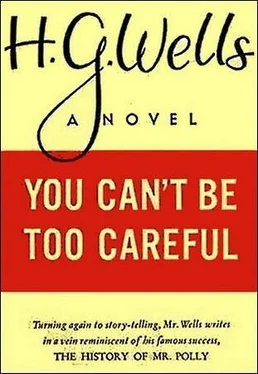H. Wells - You Can't Be Too Careful
Здесь есть возможность читать онлайн «H. Wells - You Can't Be Too Careful» весь текст электронной книги совершенно бесплатно (целиком полную версию без сокращений). В некоторых случаях можно слушать аудио, скачать через торрент в формате fb2 и присутствует краткое содержание. Жанр: Классическая проза, на английском языке. Описание произведения, (предисловие) а так же отзывы посетителей доступны на портале библиотеки ЛибКат.
- Название:You Can't Be Too Careful
- Автор:
- Жанр:
- Год:неизвестен
- ISBN:нет данных
- Рейтинг книги:4 / 5. Голосов: 1
-
Избранное:Добавить в избранное
- Отзывы:
-
Ваша оценка:
- 80
- 1
- 2
- 3
- 4
- 5
You Can't Be Too Careful: краткое содержание, описание и аннотация
Предлагаем к чтению аннотацию, описание, краткое содержание или предисловие (зависит от того, что написал сам автор книги «You Can't Be Too Careful»). Если вы не нашли необходимую информацию о книге — напишите в комментариях, мы постараемся отыскать её.
You Can't Be Too Careful — читать онлайн бесплатно полную книгу (весь текст) целиком
Ниже представлен текст книги, разбитый по страницам. Система сохранения места последней прочитанной страницы, позволяет с удобством читать онлайн бесплатно книгу «You Can't Be Too Careful», без необходимости каждый раз заново искать на чём Вы остановились. Поставьте закладку, и сможете в любой момент перейти на страницу, на которой закончили чтение.
Интервал:
Закладка:
That, in terms of general contemporary history, is the why and wherefore of the world epidemic of pogrom fever in the second Georgian period, and that is why Edward Albert, our microcosm, leaning over his garden gate and talking to Mr Copper, remarked, “These here Jews seem to be doing a lot of mischief in the world, one way and another.”
And why Mr Copper, already thoroughly infected, replied,
“And we let ’em get away with it—every time.”
You see here in Morningside Prospect in our Edward Albert just the same threefold mental stir that was to be found in the whole Morningside Prospect side of civilisation; the sick dread of some profound rearrangement of economic and social relationships impending, a dread expressing itself defensively in an irrational fear of “Bolshevism”; the same unpleasant realisation of a common nerveless conduct of affairs leading to the craving for a saviour and leader, and the same disposition to discover a scapegoat, for which role the Jewish Champions were already preparing their “people.” The world now and henceforth is doomed to live in an increasing community of interpretations, and these three factors were to be found among the threatened governing classes, all round the globe from pole to pole. The Bolshie, the Jew and the inspired Leader, all essentially imaginary beings, were becoming the three cardinal figures in a new mythology of escape from thought, starkness and courage.
Wherever the pound sterling and the dollar were current and freely exchangeable with local money, this mythology prevailed, masking the hard realities of the abolition of distance, the ever-increasing release of physical and human energy and the gathering resentment of the poor, the exploited and the frustrated majority of mankind. These triple ingredients brewed the final explosion of the Old Order, which that triple mythology prevented men from anticipating and averting.
But if that mythology was world-wide, it still varied greatly in its realisation in different regions of the earth. There were great differences in phase. Homo Tewler in his Western, Scandinavian and Polish varieties was not so widely different from Anglicanus; he presented the same mythological triangle and the same underlying forces, but until America had that rather alarming financial jolt in 1932 which put an end to its “sturdy individualism” for ever, there was not the same apprehension of possible calamity that was setting all Europe peering about for scapegoats and conspirators. But, as the New Deal unfolded, American myth and reality began to take on an increasing parallelism with Europe. In Russia the Muscovite Homo Tewler, after a tremendous constructive effort after the war, and after a phase of experimental strain and stress, lapsed for a time under the autocratic rule of a Saviour, forgetting or liquidating the old Bolshies and feeling no need for any other victims.
Homo Tewler Teutonicus, sharing the new mythology, was nevertheless in a different and more formidable mood than any of its neighbours in the world. It was smarting from a sense of accepted defeat and sustained disadvantage. It was very much in the state of mind of Edward Albert in the days when he endured .the punches of Horry Budd and pretended not to mind them. It was working up to the “Vad—a-nuff-o-vis” phase and the hysterical and vicious smacking of that young gentleman’s face. Sooner or later Homo Tewler Teutonicus was bound to fight. The particular event that. fired the magazine belonged to the chapter of accidents. The British Government played the part of those Bolter’s College Old Boys who lost the match through stupid over-confidence, and so put spunk into Edward Albert. They put spunk in the faltering German patriot. If it had not been the Nazi triumvirate of Goering, Goebbels and Hitler, it might have been the much more formidable Germany of the Strasser brothers. Or some other combination. But at the contemporary level of world intelligence it was as inevitable as dawn a week ahead, that Germany would start a war.
But what the world mind had still to grasp was the tremendous increase in destructive energy that had occurred since the clearing-up wars that followed the Treaty of Versailles. Even the people, the Fascists and Nazis who were most obviously and ostentatiously getting their feet upon the war path, had only a very feeble premonition of the immense smash they were going to make. Many people thought that war was approaching again; even Edward Albert remarked that “all this here armament don’t look like peace for ever, does it? Something ought to be done about it.” But they thought always of the old sort of war and not of war right out of control and a world blown to smithereens. And Morningside Prospect thought no more of warfare on its own golf links than of Martians out of the sky. Talk about disarmament went on among the representative Tewlers gathered at Geneva, but the arms salesmen made sure that these deliberations came to nothing.
Edward Albert became aware of Adolf Hitler, not as a personal enemy who was going to Shatter all the complacencies of his life, but as a strange, rather comic, figure in that pleasantly defeated Germany, somewhen about the time of the Reichstag fire. Mrs Tewler was shopping in Gage and Hopler’s emporium and Edward Albert was waiting for her in die convenient waiting-room beyond the soda fountain and the Hairdressing. He picked up an illustrated paper and found pictures of the Fuehrer in full blast.
“Look at that,” said Edward Albert.
“What’s he so excited about?”
“Politics.”
“Looks as if he ought to be took care of somewhere. He’s worse than that great ugly Mussolini. People like that didn’t ought to be let go about loose, all dressed up and ’owling and threatening everyone who don’t agree with them. You don’t know what mischief they may do sensible people.”
Thus Mary, revealing an anticipatory gleam of sapiens in her composition.
“No affair of ours,” said Mr Tewler, true to type, true to the specific quality that will never see what is coming to it until after it has been hit.
Later on he became more aware of the Nazi triumvirate and more particularly of” This here Hitler M.
Mr Copper of Caxton and Mr Standish of Tintern, in particular, were inclined to take a favourable view of this now rising star. “He may have his faults,” said Mr Copper, “but he and Musso stand like bulwarks between us and the Bolshies. Never forget that. And as for his treatment of them Jews—well, they ask for it.”
“They do do that,” said Edward Albert.
“You can’t trust a Jew with a fair-haired girl-servant. Same thing at Hollywood. I expect poor Hitler has his story to tell. And then these French. They’ve treated the Germans badly. How would you like to go out on the links and find some great. Senegalese nigger running about and raping every English girl he sets eyes on? I was reading a bit in a book the other day by Mr Arthur Bryant. There’s things flesh and blood won’t stand.”
That gave Edward Albert food for thought. He tried to think of himself as Sir Galahad clearing Soudanese niggers off the links and comforting their victims by a kind word or so before starting his round.
Mr Pildington, said that bringing coloured soldiers to Europe had been a great mistake. “The tales they take back! No respect left in them.... We did it and the French did it and we shall pay for it. Mark my words....”
“One thing we must never forget about Mussolini,“ ‘ said the vicar of Casing to Mrs Rooter in an earnest friendly talk at Harvest Thanksgiving. “Mustard gas or no mustard gas, he did put back the crucifix in the schools. I could forgive him many things for that.”
But Mrs Tewler took a different view. “These violent men ought to be put under control now,” she said. “They’ll do the world a mischief.”
Читать дальшеИнтервал:
Закладка:
Похожие книги на «You Can't Be Too Careful»
Представляем Вашему вниманию похожие книги на «You Can't Be Too Careful» списком для выбора. Мы отобрали схожую по названию и смыслу литературу в надежде предоставить читателям больше вариантов отыскать новые, интересные, ещё непрочитанные произведения.
Обсуждение, отзывы о книге «You Can't Be Too Careful» и просто собственные мнения читателей. Оставьте ваши комментарии, напишите, что Вы думаете о произведении, его смысле или главных героях. Укажите что конкретно понравилось, а что нет, и почему Вы так считаете.












